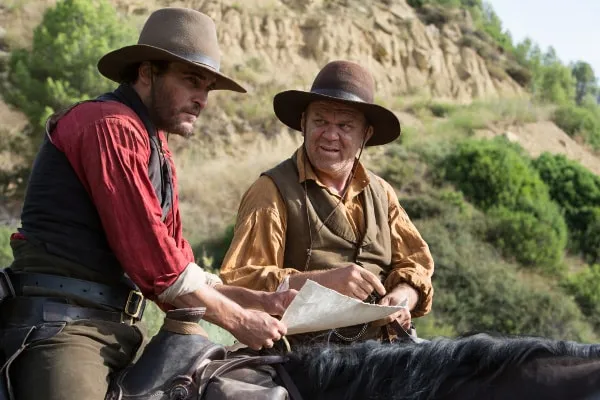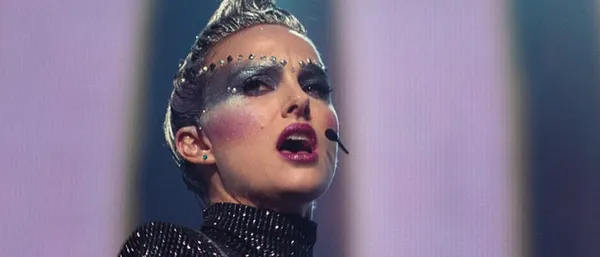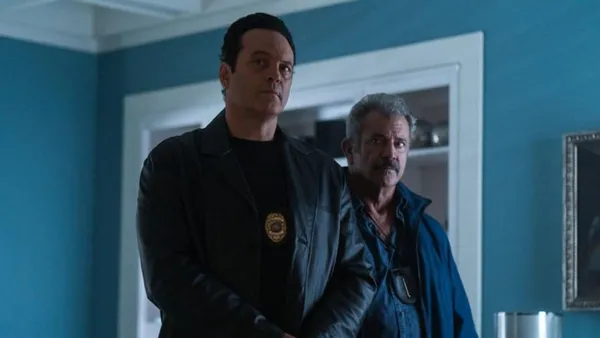 |
| The Sisters Brothers: 'It’s a traditional bounty hunt but with an unusual air of sophistication' Photo: Courtesy of San Sebastian Film Festival |
The Sisters Brothers galloped into town hard on the heels of Buster Scruggs to charm and thrill in equal measure, proving that Venice's winning streak would likely continue past the always front-loaded weekend. Jacques Audiard’s first English-language feature proved to be quite disarming; funny and bloody, although not quite as wince-inducing violent as some of his previous work, this adaptation of Patrick DeWitt’s 2011 novel is a wonderful subversion of traditional western myth. It stars Joaquin Phoenix and John C Reilly as Charlie and Eli Sisters, two hired gunmen working for a mysterious paymaster called The Commodore (an especially shifty Rutger Hauer). The Commodore is looking for businessman Hermann Kermit Warm (Riz Ahmed), who has reneged on a deal with him, so the brothers are sent to meet an urbane private detective, John Morris (Jake Gyllenhaal), who has the man in his sights.
It’s a traditional bounty hunt but with an unusual air of sophistication. Though Charlie is an reconstructed cowboy to the core, Eli is tired of the old ways, of blood feuds and high noons, and would likely to just settle down quietly and open up a little haberdashery somewhere. He seems to get his wish when their travels alert them to the easy (and safer) cash to be made from gold-prospecting, but, once again, Charlie pulls him back and puts their lives in danger.
More disappointing was Sunset, the highly anticipated new film from László Nemec, the director of Cannes and Oscar hit Son Of Saul, an epic Holocaust drama filmed in claustrophobic close-up. After the dust had settled, there were two schools of thought about it: some thought the story of a young Hungarian milliner confronting dark family secrets to be a bold allegory for the increasing aggression that erupted into the First World War, while others saw it as a wilfully baffling conspiracy story with shades of Eyes Wide Shut. Both could agree that it was another epic period drama filmed, yet again, in claustrophobic close-up.
Also delivering a minor work was Olivier Assayas with Non-Fiction, the story of a book publisher (Guillaume Canet) dealing with a flaky author who is notorious for drawing pruriently on his own private life, and an unfaithful wife (Juliette Binoche). Its commercial chances are slim, but for aficionados of intelligent French cinema there’s something to be said for the conversations that are had within. A neat companion piece to Mia Hansen-Love’s L’Avenir (Things To Come), it’s a talky, thoughtful work that can be fitfully amusing while making some interesting points about art and literature in the digital age.
Likewise, Rick Alverson followed the brilliant and almost unwatchable Entertainment with a black comedy in a similar vein, minus the brilliance. Set in the Fifties, The Mountain stars Tye Sheridan as a young man working in the ice rink that belongs to his father (Udo Kier, and, yes, you read that correctly). When his father dies, the boy meets a charming lobotomist (Jeff Goldblum), who takes him under his wing. Deadpan adventures follow, in a film surely made as a bet between Alverson, Michael Almereyda and Guy Maddin to see who can come up with the most preciously quirky and patience-testing US indie of all time.
Meanwhile, good under-the-radar genre discoveries seem to be thin on the ground at most festivals lately, and Venice was no exception, although Craig S Zahler did surprise everyone by coming back to the Lido just 12 months after his prison bruiser Brawl In Cell Block 99. At two-and-a-half hours, the follow-up, Dragged Across Concrete, promised even more nihilistic action, but, surprisingly, although there are some very queasy scenes, it doesn’t go all out in the way that Zahler’s previous films – Brawl and Bone Tomahawk – have done.
Instead, it’s a more a meditation on late-life dissatisfaction, with Mel Gibson as Brett Ridgeman and Anthony Lurasetti, two hard-ass cops who get suspended for mistreating a suspect under arrest. The suspension, without pay, only lasts a few weeks, yet Gibson feels the need to put in some freelance work, intercepting a robbery of some kind that is going on somewhere in the area. It’s not the most believable set-up, but Zahler throws in the story of Henry Johns (Tory Kittles), a young African-American ex-con, who’s the getaway driver on the job, and who takes the story into interesting directions when the heist – can you believe it? – goes wrong. Zahler’s dialogue can be maddeningly mannered, but he has a really good eye for action set-pieces, and there are some magnificent examples here.
A little more chewy was Mary Harron’s Charlie Says, a provocative take on the well-covered story of cult leader Charles Manson and the two-night murder spree that horrified Hollywood in August 1969. Starring a surprisingly good Matt Smith as a charming Charlie, all smiles and goofy gobbledygook in the early scenes, Harron’s film – penned by regular collaborator Guinevere Turner – flashes backwards and forwards between the prelude and the aftermath, focusing on the girls that did, and are still doing, jail time for the crime. Charlie Says was criticised in some camps for its ambiguity about the girls’ guilt, but, in a way, that’s what’s good about it. “No sense makes sense,” was Manson’s mantra, and no amount of books or movies will ever really explain what made three normal American girls take part in the butchering of seven innocent people; instead, Harron takes us on a fascinating journey inside their heads.
 |
| Vox Lux: 'Channelling everyone from Lady Gaga to Madonna and Rhianna, Natalie Portman rules the second half with an almost superhuman presence' Photo: Courtesy of Venice Film Festival |
There were no easy answers to be had in Brady Corbet’s Vox Lux either. Though it’s way more accessible than his austere 2016 debut, the White Ribbon-esque period drama The Childhood Of A Leader, the follow-up is yet another immersive experience, telling the story of Celeste, a teenage school massacre survivor who grows up to be the biggest pop star on the planet. Split into several chapters – a device also used by Yorgos Lanthimos and Luca Guadagnino this year – Vox Lux starts out as a melancholy coming-of-age tale and ends as the study of an imploding diva.
Channelling everyone from Lady Gaga to Madonna and Rhianna, Natalie Portman rules the second half with an almost superhuman presence. The acid diatribes are to be expected, but Portman makes a surprisingly convincing pop star, going toe to toe with her Spandex-covered dancers. It ends on a curiously blank note, after setting up several possible avenues for high drama, but in the end Corbet pulls away from Celeste in the middle of her precocious delirium. Is she a goddess, a bitch or a witch, and, whatever she is, how long will she keep getting away with it? That’s for you to decide, and it’s a question for our celebrity-addicted times.
Read our report on First Man, Peterloo, Roma, The Ballad Of Buster Scruggs and Suspiria.

























